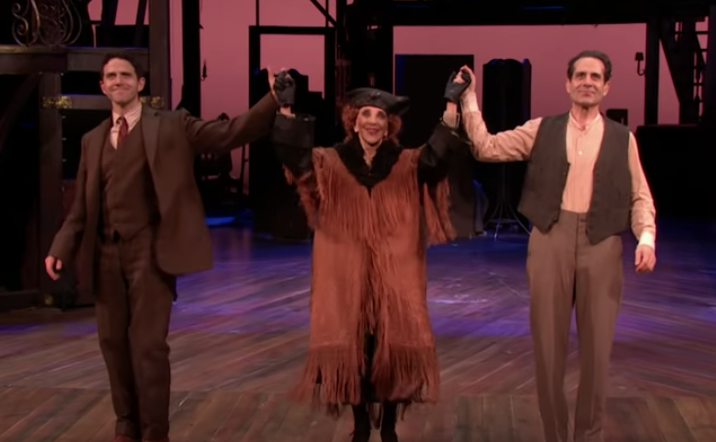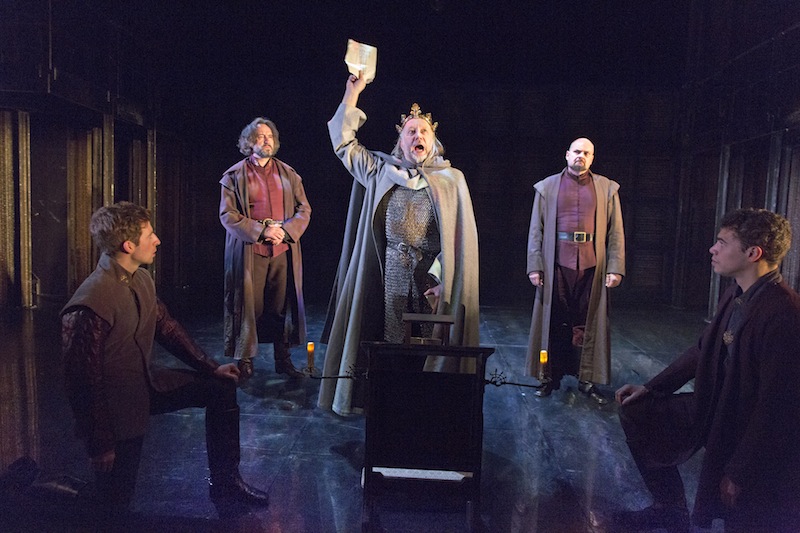By Samuel L. Leiter
The latest arrival in what seems like a seasonal festival of LGBT theatre, films, and TV is Off-Broadway’s Southern Comfort, inspired by Kate Davis’s prize-winning 2001 documentary of that title, conceived for the stage by Robert DuSold and Thomas Caruso (who directed). Davis’s film is a sensitive, laid-back, sometimes clinical documentary that covers the last year in the life of a rural Georgia country girl named Barbara turned country boy named Robert. During the filming, Robert Eads is dying of ovarian cancer, an ironic attack on the only part of him still female. The film emphasizes how many doctors were unwilling to treat him, and how many others like him are (or were) ignored or given inferior treatment.
Southern Comfort’s title comes from a popular annual transgender conference in Atlanta, known as SoCo, where the participants share, bond, and inform in a loving, supportive environment. It was Robert’s favorite experience, and he lived long enough to visit it one more time. Much of this finds its way into the show, but new material also is introduced, not always successfully.
Apart from the credits, the film’s soundtrack includes only a smidgen of country music, but the show is a musical with nearly two dozen bluegrass numbers; sorry to say, the movie’s understated, low-keyed depiction of Robert’s decline effortlessly draws more tears than the overly sentimental, overdramatized levels to which the material has been jacked up. Southern Comfort comes off strong in the good works department but less so as memorable theatre.
In development for a decade, with two prior stagings (one by New York’s Cap21 and the other by the Barrington Stage Company), Southern Comfort focuses on Robert (Annette O’Toole) and his “chosen family” of five close friends, most of whose names have been changed from the documentary. His crossdressing girlfriend, transitioning, is still Lola Cola (Jeff McCarthy) but his other friends are Jackson (Jeffrey Kuhn), the younger man he considers a “son;” Jackson’s girlfriend, Carly (transgender actor Aneesh Sheth); and Sam (Donnie Conciotto, also transgender). Only Sam’s girlfriend, Melanie (Robin Skye), is cisgender. Minor characters (including Robert’s stubborn parents, unable to stop calling him Barbara) are played by four of the five band members, who step into the action when needed, and also serve as a Greek chorus.
Most of the action takes place on Robert’s property in backwoods Georgia (a.k.a. “Bubbaland”), where the friends congregate monthly. James J. Fenton ignores the trailer shown in the film and converts Robert’s yard into attractive wooden decking and a gazebo, complete with hanging swing. A huge tree-like construction with Christmas lights, its leaves replaced by diorama scenes from Robert’s life, dominates a setting brought to life by Ed McCarthy’s lovely lighting.
Robert and his buddies recall the year leading up to SoCo and his death, but, since the film’s theatrics are so muted, book writer Dan Collins (who also wrote the heavy-on-narrative lyrics for Julianne Wick Davis’s music) has created overt conflicts where none exist, or are only hinted at, in the original; most egregious is a climactic scene about phalloplasty between Robert and Jackson that seems forced. It’s understandable that the narrative line for a musical has to be more dramatic than its documentary source, but when every emotion is expressed not only in dialogue but in nearly two dozen not especially distinctive songs, most of them iterating some aspect of transgender problems, the effect leans toward the didactic and treacly.
Among the fine cast the biggest impression is made by Annette O’Toole, working her talented butt off to channel Robert’s gravelly drawl, slouching walk, and good old boy demeanor; she actually manages to slightly resemble him (chin whiskers, pipe, and cancer-caused thinness included). However, since she’s about half his size, when paired with the burly, full-head-taller, big-voiced McCarthy’s Lola (a close resemblance to the real one) she looks like Robert’s Mini-Me.
Southern Comfort, the liqueur, blends an alcoholic punch with fruity sweetness. Southern Comfort, the musical, could use more emotional punch and less artificial sweetness.
Southern Comfort. Through March 27 at The Public Theater (425 Lafayette Street). www.publictheater.org
Photo: Carol Rosegg






















